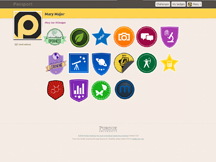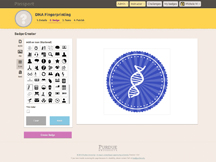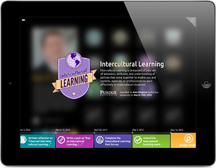ACADEMIA
Digital badges show students' skills along with degree
Digital badges, icons that represent academic achievements or skills smaller than a college degree, are an increasingly popular way for universities to acknowledge the breadth of student learning.
Now Purdue University has developed a pair of mobile apps that make creating, awarding and displaying badges much easier. The apps, available online, are called Passport and Passport Profile . A video explaining how Passport works is available on YouTube.
Kyle Bowen, director of informatics in Information Technology at Purdue, says badges are an exciting new concept that is being adopted across higher education.
"Badges become a way to recognize learning in all of its forms," Bowen says. "Passport provides a platform for anyone who wants to deliver learning credentials. From creation of the challenge to creating the actual badge image itself, and then a way to display earned badges, it's all built into the platform.
"Many instructors are moving to new models of instruction, and Passport is a technology that supports many of those new models."
Gerry McCartney, Purdue's vice president for information technology, CIO and Oesterle Professor of Information Technology, says digital badges can sometimes provide a better view of a student's academic experience.
"Students learn in many ways and in a variety of settings while attending a university such as Purdue," McCartney says. "In addition to formal lectures and homework, there is also time spent in labs and doing field work; time spent in service projects or internships; and experiences they glean from student organizations. The Passport app will give interested faculty and advisers another way to recognize and validate those skills for students."
Through their college careers, students gain knowledge and skills that may not be well-represented in their college degrees. A student may have learned practical skills such as knowing how to write HTML code, have earned a prestigious scholarship or served as an officer in a student organization.
Badges are currently in use or in development at institutions such as MIT, Carnegie Mellon, the University of California-Davis and Seton Hall. Organizations outside of higher education are issuing badges, too, including NASA, the National Oceanic and Atmospheric Administration, The U.S. departments of Veterans Affairs and Education, the Corporation for Public Broadcasting, and the movie studio Disney-Pixar.
Purdue's Passport platform integrates with the popular Mozilla Open Badge Infrastructure, including Mozilla Backpack. This system, developed by the same organization that develops the Firefox Web browser, allows the digital badge to include metadata such as who issued the badge, how it was earned and when it was earned; users display their badges through the Backpack site.
Mark Surman, executive director of Mozilla, says badges empower learners to take charge of their online identities and reputations.
"We believe digital badges are the next step in unlocking the full educational potential of the Web," Surman says. "As a nonprofit organization committed to the power of open collaboration and learning, we're extremely excited to see Purdue take this step. It's a milestone for the entire OpenBadges project."
Bill Watson, an assistant professor in Purdue's Department of Curriculum and Instruction, was instrumental in creating (http://www.itap.purdue.edu/newsroom/detail.cfm?NewsId=2550) the Passport platform and will be using Passport in a graduate-level course this semester. He says the advantage of badges is that they allow faculty to focus on competencies, skills and learner performance.
"Typically in courses, we have a number of very broad learning goals, and grades are given out on student assignments tied to these broad goals," Watson says. "But really, it is more a comparison of students rather than a focus on student learning and attainment of desired learning outcomes.
"Badges help instructors encourage students to demonstrate how they have met very specific learning objectives through actual performance."
Purdue's Passport platform consists of two apps: The Passport app allows instructors to set the steps, or challenges, a student must achieve to earn the badge. The app also allows an instructor or adviser to create a badge by choosing from several templates.
The second part of the platform is Passport Profile. This is an app designed for tablets that allows users to display their badges, both Passport badges as well as badges from their Mozilla Backpack.
"We've created it so that you can easily show the badges and the information behind them while holding the tablet and showing it to someone," Bowen says. "That way you don't have to keep taking the tablet away to navigate through the app. You can show the work behind the badge as you speak."
Bowen says the Passport Profile app is operated a bit like a guitar. A user holds his or her tablet with the screen facing the interviewer and operates tabs along the bottom of the screen as if they were frets on a guitar neck. Then the user "strums," or flicks, through screens and images to display his or her portfolio.
"It's designed to work with large gestures so that you don't have to have a good view of it yourself to show off your portfolio," Bowen says. "You don't have to click on small buttons with your fingertip. You just make these large gestures that let you move through your presentation."
In addition to displaying Passport badges, the latest version of Passport Profile, which has been submitted to the Apple iTunes App Store, can also display any Mozilla Open Badge.
Each badge also has a URL that users can share on social media sites. "As we get more users we'll build in a share function," Bowen says.
A sample badge is available at http://www.openpassport.org. At the site users can create a Passport account or login using their Facebook or Google+ credentials.
Among the first uses of badges at Purdue will be for students who have successfully completed courses through nanoHUB-U, a collection of short courses in nanotechnology offered online to an international audience.
The courses focus on technical subjects in science and engineering; upcoming courses for this fall include "Fundamentals of Atomic Force Microscopy" and "Nanoscale Transistors." Students who successfully complete the courses based on scores from five weekly exams and the scientific simulation and virtual experimentation homework assignments will receive a badge. Students who successfully completed previous Purdue nanoHUB-U courses in "Fundamentals of Nanoelectronics" have already been given the opportunity to receive Passport badges.
In the Spring of 2013 nanoHUB-U will offer badges for the classes "From Atoms to Materials: Predictive Theory and Simulations" and "Thermal Energy at the Nanoscale."
Purdue is looking for instructors or institutions that would like to try the beta version of Passport as part of its test pilot program.
"We're looking for up to 200 instructors and up to 10,000 students outside of Purdue to test the app," Bowen says. "There's no charge for instructors to use the app, but we would like feedback on how it was used in the classroom and suggestions on how to improve the application."
Instructors interested in using the Passport app can sign up at thePurdue Passport site.
Passport and Passport Profile are two of six classroom apps created by the Purdue Studio project. The apps can be used by instructors or students to enhance the traditional classroom experience.
